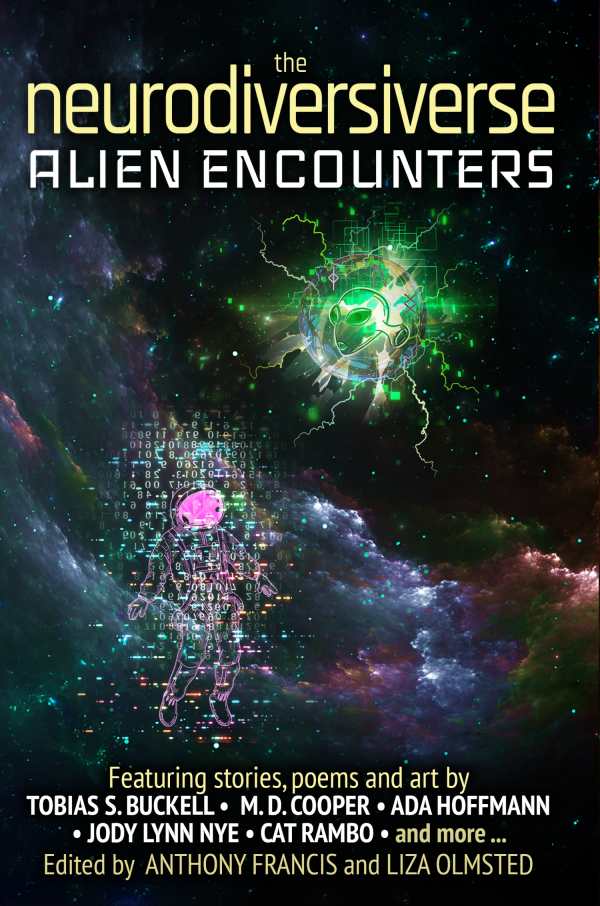The Neurodiversiverse
Alien Encounters
A precise and celebratory anthology, The Neurodiversiverse treats differences as strengths in science fiction settings.
Edited by Anthony Francis and Liza Olmsted, The Neurodiversiverse is a science fiction anthology featuring short stories, poems, and art about uplifting encounters between neurodivergent humans and aliens. Its human characters are often mocked or ostracized in daily life due to conditions like autism, ADHD, and anxiety, but they are empowered when their unique perspectives and sensitivities allow them to connect with extraterrestrials who also struggle with the status quo.
Since each work is from a different creator, they all utilize different tones. “Music, Not Words” is filled with dreamy imagery and simple, bemused thoughts that exemplify the innocence of its child protagonist, while “The Grand New York Welcome Tour” is written with the more precise, jittery voice of a new employee anxious to please their clients. The scopes vary too: “Shadows of Titanium Rain” has tense life-or-death stakes for a crew exploring a foreign moon, but “Where Is Everybody?” is a more casual slice-of-life scenario portraying a romantic meet-cute.
The poems and art tend to be more abstract than the stories. For example, “Wi(d)th, De(p)th, Brea(d)th” uses unconventional punctuation, syntax, and formatting to convey the curiosity and awe of an interspecies meeting; the illustration “LoveHEART” depicts a realistic human heart with floral growths protruding from it. Still, each work is precise. The book’s reigning dedication to underrepresented populations binds its pieces together, too: many characters have other marginalized identities in addition to their neurodivergence, such as being queer or physically disabled.
Some works interpret the concept of aliens in novel ways, as with “Scary Monsters, Super Creeps,” about a society dominated by superpowered individuals who appear human but may be the products of a secret alien invasion. In “The Zeta Remnant,” the alien is a threat rather than a peaceful guest. However, most entries feature sensitive humans who are considered strange because of their unusual speaking style, habits, and interests, who make contact with aliens and are thrilled that their quirks earn them friendship rather than judgment. These themes recur enough to become predictable; still, each entry is earnest, empathetic, and attentive to disenfranchised populations, and all are resonant on their own merit.
Variety is introduced in the book’s bevy of settings and subject matters, though. “The Pipefitter” depicts an emergency on an intergalactic ship; “The Interview” follows an alien hiring a human for a corporate role; and in “Close Encounter in the Public Bathroom,” a narrator breaks through their compulsions to help an alien escape. Some works incorporate cynicism, prejudice, and violence, as with a reference in “McCarthy Knew” to aliens provoking human leaders into nuclear warfare, but most end on hopeful notes: challenges are addressed with clear communication, radical compassion, and optimism for a better future. Topics that may be triggering are flagged, and this thoughtfulness is also apparent in the preface, which explains the intentional language choices made throughout.
The Neurodiversiverse is a warmhearted science fiction anthology that celebrates those whose greatest strengths are that which makes them different.
Reviewed by
Jenna Lefkowitz
Disclosure: This article is not an endorsement, but a review. The publisher of this book provided free copies of the book and paid a small fee to have their book reviewed by a professional reviewer. Foreword Reviews and Clarion Reviews make no guarantee that the publisher will receive a positive review. Foreword Magazine, Inc. is disclosing this in accordance with the Federal Trade Commission’s 16 CFR, Part 255.

